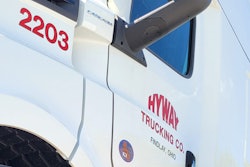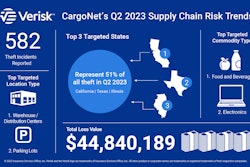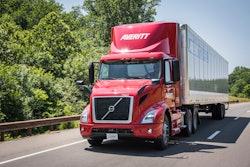Cargo theft recording firm CargoNet recently released its 2023 Second Quarter Supply Chain Risk Trends Analysis, which indicated a 57% year-over-year increase in cargo theft, along with an average shipment value per event increase of nearly $100,000.
A prior report from CargoNet just before the Labor Day holiday indicated that the firm was seeing what it called an “unprecedented crime wave” affecting freight in the U.S. Scott Cornell, transportation lead and crime and theft specialist at Travelers, joins us this week for the first part of a two-part episode to talk about why theft is on the rise and the strategies thieves are using to steal freight.
Contents of this video
00:00 10-44 intro
00:28 Cargo theft
01:19 10-year high for cargo theft
03:24 re-brokering freight
05:27 Strategic cargo theft
09:03 Most targeted commodities
12:08 Where cargo theft is taking place
Jason Cannon:
This week's 10-44 is brought to you by Chevron Delo, 600 ADF ultra low ash diesel engine oil. It's time to kick some ash. Cargo theft is skyrocketing in 2023. What are the trends? You're watching CCJ 10-44, a weekly episode that brings you the latest trucking industry news and updates from the editors of CCJ. Don't forget to subscribe and hit the bell for notifications so you'll never miss an installment of 10-44.
Jason Cannon:
Hey everybody, welcome back. We have a special treat for you this week and next week. This is the first of a two part series on cargo theft. I'm Jason Cannon and my co-host on the other side, as always on this installment and the next one is Matt Cole. Cargo theft recording firm Cargo Net recently released its 2023 second-quarter supply chain risk trends analysis, which indicated a 57% year-over-year increase in cargo theft along with average shipment value per event increase of nearly $100,000.
Matt Cole:
A prior report from Cargo Net just before the Labor Day holiday indicated that the firm was seeing what it called an unprecedented crime wave affecting freight in the US. Scott Cornell, transportation lead and crime and theft specialist at Travelers joins us this week for the first part of a two-part episode to talk about why theft is on the rise and the strategies thieves are using to steal freight.
Scott Cornell:
It's unprecedented. We're at a 10-year-high for cargo theft right now. And I think what is being referred to primarily when we talk about an unprecedented increase is the unprecedented increase in what we call strategic cargo theft. There's really two types of cargo theft, there's straight theft which is when they go straight out to where it sits. That's how it got its name. They go straight out, take it where it's sitting, truck stops, parking lots, distribution centers, drop lots, you name it. They physically go out, they steal the tractor and the trailer or through PIL fridge they open the rear doors and they steal part of the load. All those are what we consider in the street theft category. Strategic theft, which is where they've reported recently a 1220% increase, so when you talk about unprecedented that's an unprecedented number. So strategic cargo theft is basically when the bad guys trick you into giving them the cargo.
The most common methods for this are identity theft and fictitious pickups. Now, CargoNet quite often uses fictitious pickup as the name for that category. But we both agree that what they're referring to there, I just did a webinar with Ralph Pepe from Cargo Net, and while he uses fictitious pickup we all both refer to it as strategic cargo theft as well. And the reason for doing that is because when they commit a fictitious pickup, the details behind it, how they do it, the method is different than an identity theft. So we kind of lump everything into that strategic theft category and talk about it that way. So the most common one is identity theft, and what we're seeing today is they commit identity theft first, meaning they'll impersonate the trucking company. They'll steal the identity of a legitimate trucking company. They pretend to be ABC trucking.
They either flood your call center, if they really want a load, they see that you're posting a load that they want they will flood your call center. They'll have 20, 30, 40 people call your call center, whatever is necessary so that they increase their chances of getting the load. They get the load under a false pretense of being ABC trucking, they're not really them. And then when they're booked on the load, they turn around and either pretend to be the freight broker that they just got the load from, or they just pretend to be some other freight broker. They then turn around and re-broker the load to a legitimate trucking company. Now, I always want to be crystal clear on this, that legitimate trucking company doesn't know that they're being involved in a theft. They think that they're doing what they do every day. They're getting a phone call from a freight broker. The freight broker says, "Hey, we have you on our approved carrier list. We need to know if you have any capacity." If they answer yes, they book the load.
That trucking company doesn't have any idea that they're being involved in this. So they use that legitimate trucking company, they'll pick up the load. And then quite frequently what we're seeing now is they have them, what they say, "Hey, once you pick up the load, give us a call. We'll give you the rest of your directions." That driver then picks up the load, they call and they say, "Hey, we're going to have you take it to this cross dock location." This is a very common thing that we're seeing recently. They take it to a cross dock location, and we're seeing these locations all across the country. And that's the beginning of laundering the freight, changing the identity of the freight. So if it hits that cross dock and the paperwork says laptops, they may now change that paperwork to just say electronics or FAK freight of all kind.
So in essence, they're now laundering the freight. They then will have either another legitimate trucking company pick it up on the other side of that cross dock, or they will pick it up quite often from there. They will either take it to its final destination or they will take it to a holding location, which is like a public warehouse or where they can rent some space and they'll either sit on it until they have a final buyer or a final destination. If they do that, they tend to reassign it paperwork again. So they've laundered it twice now. They've kind of changed the essence of what it is twice, and then they put it back into the supply chain. They begin to move it through the supply chain. So that type of strategic theft is the most common that we're seeing right now. Fictitious pickup is also another type of strategic theft and just plain double brokering is another category in there. But that 1220% increase in that specific type of cargo theft is unprecedented, just like they labeled it.
Jason Cannon:
Scott says that while straight cargo theft is still the most common, the increase in strategic cargo theft has made it easier for thieves to stay hidden in the shadows.
Scott Cornell:
What I always say about this is in that way, they have the ability to be at arm's length. When you talk about straight cargo theft, they physically go out and steal it where it sits and now they're at risk. They're at more risk. If they're at a truck stop stealing it or they're at a drop lot or a parking lot or a warehouse or something like that, there's a chance that somebody's going to catch them. Somebody's going to confront them, they're going to get caught somehow. And when you use strategic cargo theft, you can basically be anywhere and steal anything anywhere. You don't have to go near the ports. You don't have to go in all the industrial centers where we normally see cargo theft. Now, to be clear, straight theft is still the number one type of cargo theft. But the biggest category or the category that's seeing the biggest increase is that strategic cargo theft method.
So it allows them to put themselves at arm's length to not be onsite, on location. And in essence, they're putting that legitimate trucking company out there. And they're doing that because again, that legitimate trucking company doesn't know that they're involved in anything wrong. So at the point of pickup where somebody might try and do some additional screening, "Hey, can we take a picture of your driver's license? Can we take pictures of your tractor and your trailer?" Things like that, where you sign for the cargo, things like that. Well, there's not going to be any resistance by that driver. That driver's not going to say no because they're doing what they do every day. And they're not trying to hide anything like a cargo thief would if they were doing say, a fictitious pickup where they arrive on scene pretending to be the trucking company that is supposed to pick up the load.
And now maybe somebody's a little bit nervous or they try and hide their face, things like that that can raise suspicion and increase risk for them. So they like this arm's length approach, and we think we're going to continue to see big increases in that.
Matt Cole:
Food and beverages are the most targeted commodities by cargo thieves. Scott explains why that is, after a word from 10-44 sponsor, Chevron lubricants,
Jason Cannon:
Protecting your diesel engine and its aftertreatment system has traditionally been a double-edged sword. The same engine oil that is so essential to protecting your engine's internal parts is also responsible for 90% of the ash that is clogging up your DPF and upping your fuel and maintenance costs. Outdated industry thinking still sees a trade-off between engine and emission system protection, and Chevron was tired of it. So they spent a decade of R and D developing a no compromise formulation. Chevron lubricants developed a new ultra low ash diesel engine oil that is specifically designed to combat DPF ash clogging, DELO 600 ADF with omnimax technology cut sulfate ash by whopping 60%, which reduces the rate of DPF clogging and extends DPF service life by two and a half times.
And just think what you can do with all the MPGs you're going to add from cutting your number of regions. But DELO 600 ADF isn't just about after treatment. It provides complete protection, extending drain intervals by preventing oil breakdown. Before you had to choose between protecting your engine or your aftertreatment system and now you don't. 600 ADF from DELO with omnimax technology, it's time to kick some ash.
Scott Cornell:
Food and beverage is the number one category. Again, we predicted a couple of years ago that this would come back to the forefront. If you could say, when cargo theft stabilizes... I don't know if that's the right way to say it, but when cargo theft tends to stabilize or become more routine, I guess in the way it's going on, we usually see food and beverage in that top category. One of the things we always talk about is cargo thieves have a golden rule, and that golden rule is, I'm going to steal what I know I can sell. That's what they do. And so if we do a little historic examination of it, going prior to 2008, if we go that far back, I always like to kind of tell this tale. I think this lays out how these things happen. Going prior to 2008, the economy was booming.
People were spending money on luxury items. Electronics was the number one storm commodity for several years. 2008, we have the economic downturn, and by 2010 food and beverage becomes the number one stolen commodity. Well, what drove that? What drove that was the fact that during economic hardships or downturns, people will revert back to the basics. They're going to house themselves, feed themselves, clothe themselves and just trying to weather the storm, so to speak. Well, we know that they made that move for the economic reasons of it, but we also know that shortly after making that move the light bulb went off, so to speak. And they said, "Hey, this is a really good commodity for us to steal. The evidence is consumed. It's not around very long or it spoils." You don't activate a warranty on frozen chicken over the internet. Can't ping a location of it that way.
There's no serial number on a pistachio. We always joke about that. And they kind of said, "Hey, this is a great commodity for us." Listen, if our investigative team that we have here or even when I was investigating cases, you could recover a load of or a partial load of televisions or laptops or something like that for months after the original theft, even if it was a partial recovery. But the food and beverage, that stuff is gone. It's gone in a short period of time. So they stayed in that category, that was the leading category all the way through 2019. 2020 hits, we have the pandemic and they moved to household goods. Well, if you think about the golden rule, where was everybody? We were at home. We were making home offices, home gyms, spending more time at home, making our homes more enjoyable, more pleasant to be in because we were there all the time. And so they targeted household goods. 2021, we saw a shift to electronics. What was driving that?
Well, kids were educating from home. We were working from home. There was a shortage on chips. You see how they pivot? They just continue to pivot on these things. And so now as cargo theft is again, kind of stabilized a little bit, we're back to the food and beverage commodity because that's a good commodity. Now, in that commodity they love frozen meats, frozen seafoods, energy drinks, beverages, alcohol. Those tend to be the most targeted in those commodities.
Jason Cannon:
The one thing that the move towards strategic theft has changed is where cargo theft has taken place. The most common areas are still in major metros and cities with intersecting highways. But Scott says that's beginning to change. And be sure to tune in next week for the second part of this episode that focuses on the ways fleets can mitigate their risk of theft. Be sure to tune in next week for the second part of this episode that focuses on ways fleets can mitigate their risk of theft.
Scott Cornell:
We're not seeing any change in that sense, meaning the regular hotspots are still regular hotspots. So I think in the Cargo Net Q2 report, they said California, Texas, and Illinois made up 51% of all reported cargo theft through Q2 for 2023. None of those are unfamiliar to us. We've always known California's number one, and I always like to point out it's not for lack of trying on California's part. They have always had the most dedicated law enforcement resources to cargo theft than anywhere else, between they had multiple task forces and multiple jurisdictions and things like that. So it's not for lack of trying. It's because of some of the things that you mentioned. When you look at all the busiest hotspots for cargo theft, California, Texas, Florida, Georgia, New Jersey, Illinois, Memphis, those spots all have several things in common. They have a high population density, they have strong economies.
They're near ports. Now, Illinois, Chicago and Memphis, what we look at is inland ports because of the massive rail yards. They have our arterial highways that pass through there or connect there. All these things lead up to this is why the cargo would be here. And so if that's where the cargo is, and that's where the cargo thieves are going to be. What's interesting, and what I've been pointing out a lot lately when I speak or teach on this topic is when you look at the Cargo Net hit map for 2023 or even the end of 2022, and you compare it to the Cargo Net hit map from 2020 or 2021, they're becoming vastly different. And what I mean by that is there is a very noticeable spread of those hotspots to the interior of the country and to all different parts of the country, some parts of the country that we haven't seen in the past.
Why is that? Well, this goes back to that 1220% increase in strategic theft. Now, I can steal cargo anywhere because I'm doing it virtually and I don't care where it's. I don't have to be... This goes back to what I mentioned earlier, you don't have to be in the port states anymore. If I know that there's a distribution center in Nebraska and they're moving things I want, I'm going to target the loads there. I'm going to go and target the loads that I want, not the locations that I want, because again, I'm going to hire a trucking company to go pick it up for me. So it doesn't really matter where it is.
Jason Cannon:
That's it for this week's 10-44. You can read more on CCJdigital.com. While you're there, sign up for our newsletter and stay up to date on the latest in trucking industry news and trends. If you have any questions or feedback, please let us know in the comments below. Don't forget to subscribe and hit the bell for notifications so you can catch us again next week.










